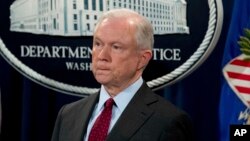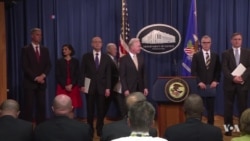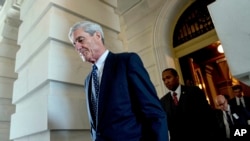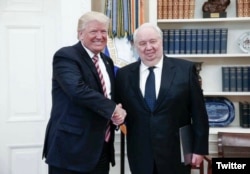The White House on Thursday expressed tepid support for the attorney general and did not rule out that a special counsel looking into Russian election interference could be eventually fired.
"The president is disappointed in the decision" by U.S. Attorney General Jeff Sessions to recuse himself from the Russia probe, said White House principal deputy press secretary Sarah Huckabee Sanders.
Pressed on whether the president retained confidence in Sessions, the spokeswoman said that "clearly he has confidence in him or he wouldn't be attorney general."
Watch: Sessions Says He'll Stay as Attorney General Despite Withering Trump Criticism
Some outside the administration saw it differently.
Trump's comments to The New York Times on Wednesday "suggest he has lost confidence in his attorney general," William Galston, Brookings Institution senior fellow in governance studies, told VOA News. "If that is the way he feels, then he probably should consider replacing Mr. Sessions, even though that would be to replace one of his earliest, strongest, most loyal supporters and someone who has helped him mightily on the immigration issue —which is probably what he cares about the most."
In an Oval Office interview the previous day, Trump told the Times he never would have appointed Sessions if he had known the former Alabama senator would step back from the probe into Russian meddling in last year's presidential election. He also warned of a red line being crossed if the special counsel leading the Russia investigation, Robert Mueller, began scrutinizing Trump's finances.
Bloomberg News reported Mueller was expanding his investigation to do precisely that — examining a broad range of transactions involving Trump's businesses, as well as those of his associates.
Sanders, asked whether Trump intended to fire Mueller, replied, "The president has no intention to do so at this time."
Galston, a former Clinton administration policy adviser, said "it's by no means clear legally" whether the president can fire the special counsel, but if he tried to do so, it "will generate a genuine crisis for his presidency that could conceivably lead to efforts to impeach him."
Sessions' intentions
Earlier Thursday, Sessions, speaking a day after the president had leveled his criticism, said he would continue in his job "as long as that is appropriate."
The president told the Times that "Sessions should have never recused himself, and if he was going to recuse himself, he should have told me before he took the job and I would have picked somebody else."
Sessions, asked about what were called the president's "disparaging remarks" at a Justice Department news conference, expressed his love for the job and his intention to continue in it.
Sessions' statement, at least temporarily, quieted some of the speculation he would quit.
The president's criticism during the 50-minute newspaper interview was seen by many observers as a not too subtle request for Session's resignation.
The attorney general had reportedly offered to resign in May, but Trump refused.
Sessions recused himself from the Russia probe in March after it was revealed that he'd had several contacts with Moscow's ambassador in Washington, Sergei Kislyak, a central figure in the probe into allegations that Trump campaign officials colluded with Russia to influence the election outcome.
After Sessions recused himself, his deputy, Rod Rosenstein, appointed Mueller, a former FBI director, as the special counsel to carry out the Russia probe. Committees in the Senate and House of Representatives are also conducting investigations.
If Sessions were to resign, experts said, it could throw Mueller's investigation into a state of uncertainty. The president would have the opportunity to nominate a replacement who would not have to recuse himself from oversight of the probe.
Trump has repeatedly insisted there was no collusion between him and Russians to influence the election.
"I have done nothing wrong. A special counsel should never have been appointed in this case," the president told the Times.
Trump also suggested that former FBI Director James Comey shared with him a file of alleged, but unconfirmed, compromising material about Trump to gain leverage.
"In my opinion, he shared it so that I would think he had it out there," Trump told the Times. The president fired Comey in May.
Comey testified before a U.S. Senate committee in June that he privately briefed Trump about the file in January because of the belief the material would soon be publicly reported and that the intelligence community should not keep knowledge of the material from the president-elect.
Donald Trump Jr.; Jared Kushner, Trump's son-in-law and a White House senior adviser; and former Trump campaign chairman Paul Manafort met last year with a Russian attorney who said she had damaging information about Trump's Democratic opponent in the presidential race, Hillary Clinton.
Trump downplayed the meeting in the Times interview, calling it "standard political stuff" and reaffirming his belief that most politicians would have taken such a meeting.
VOA's William Gallo contributed to this report.









